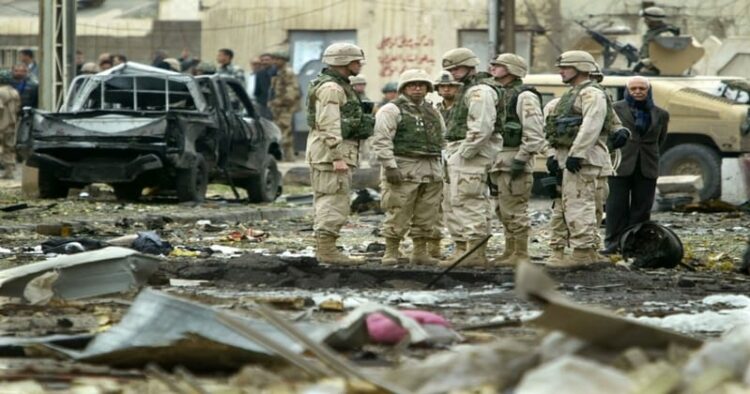The Iraq War also known as the Second Gulf War was one of the most highly intense and highly contested politics West Asia has ever witnessed.
The main belligerents and key entities involved in this conflict were the United States of America, the United Kingdom, Australia and Poland along with forty other nations. They were referred to as “Coalition Forces.” The main antagonist in this conflict was Saddam Hussein and his Iraqi military.
The war began on March 19, 2003, and lasted for a period of eight years i.e. (2003-2011).
The September 11, 2001 attacks on the World Trade Center (WTC) were very well choreographed by a terrorist group operating from Afghanistan. It was Al-Qaeda. This attack led the US government to launch a campaign against terror entities. This was called the “Global War on Terror.”
In the aftermath of the First Gulf War, the Americans could not oust Saddam Hussein from his power. The American Intelligence community felt that Saddam must be eliminated to ensure world peace.
They created false and bogey narratives to fulfil their stated primary objectives. The first accusation the US placed on Iraq was that it harboured weapons of mass destruction. Secondly, they stated that Saddam’s government is supporting Al Qaeda.
Thirdly, they accused Saddam of purchasing uranium yellowcake from Niger and high-quality aluminium tubes for their covert and clandestine nuclear program.
They further justified their claims by stating that Saddam being a dictator committed grave human rights against Kurds and other Iraqis. The US gave a narrative that it was utmostly necessary to free the Iraqi people from his tyranny.
In 2002, President George W. Bush named three nations the “Axis of Evil”- These were Iraq, Iran and North Korea. According to the Bush government, America would not allow any of the three states to use weapons of mass destruction against anyone.
In reality, UN inspectors revealed that Iraq does not have any WMD program. It was also claimed by the intelligence of other leading nations that Iraq had no hand in supporting Al Qaeda and was not responsible for the September 11, 2001 attacks.
It is noteworthy to mention that France and Germany were not in favour of the Anglo-American Invasion of Iraq. Nevertheless, they gave an ultimatum to Saddam to leave Iraq within 48 hrs.
Saddam refused and on March 19, 2003, the Coalition forces launched “Operation Iraqi Freedom” by conducting heavy air strikes on Baghdad. Within a period of four weeks, Coalition forces captured major Iraqi cities.
On May 1, 2003, The US announced its victory. On 13 December 2003, Saddam was captured by American Forces from Ad-Dawr in an operation named “Red Dawn”.
He was tried for his war crimes and human rights violations and was hanged on 30 December 2006.
The US forces had to fight an eight-year-long insurgency organised by Saddam Fedayeen and his loyalist Baath Party supporters. In the year 2011, the American government under Barak Obama called off all US forces from Iraq.
Geopolitical Effects on West Asia
A political power vacuum engulfed the nation after the US invasion of Iraq and state institutions were significantly weakened. This created an environment or a breeding ground for terrorist outfits, especially ISIS (Islamic State of Iraq and Syria) also called Daesh and Al Qaeda.
This vacuum also allowed Iran to wield considerable influence in Iraq and West Asia. The balance of power shifted from Arab states to non-Arab entities namely the United States, Iran and Turkey.
Turkey is frustrated by the secessionist demands and activities of Kurds along its borders and Northern Iraq. The same concern is shared by Iran. Iraq and Afghanistan served as “strategic buffers” and helped in curtailing the influence of Iran in West Asia. Iraq has lost most of its influence to Iran.
The Iraq war has led to a high degree of sectarian violence. Multiple factions and militias have emerged. This has led to political instability.
After the Iraq War, the succeeding Iraqi government is plagued by problems of corruption, and demographic violence.
The war caused many peoples to become refugees and seek shelter in neighbouring nations of West Asia such as Jordan. The Jordanians are also worried about the spillover of violent extremism from Iraq to their country.



















Comments